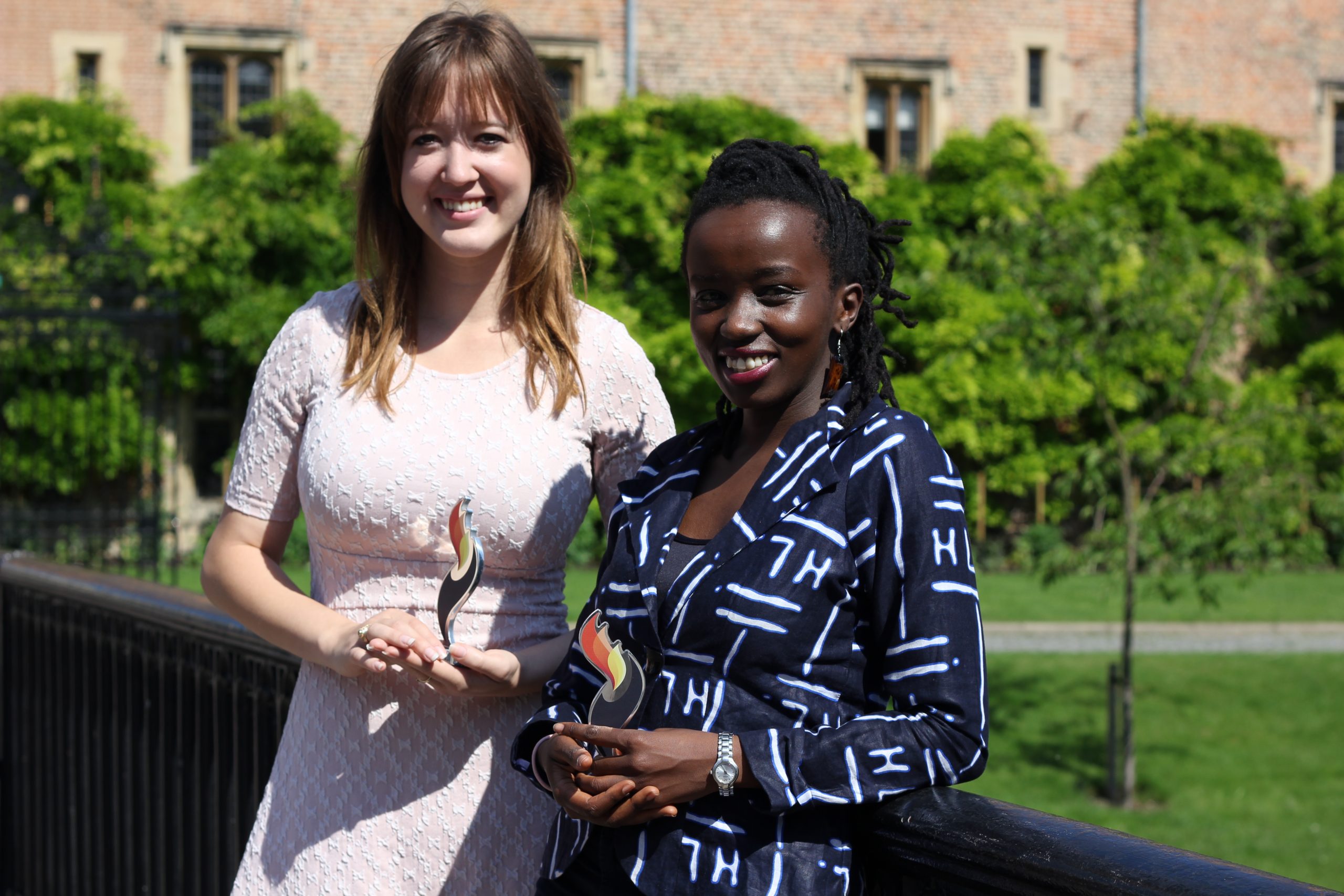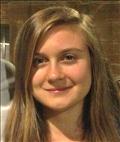
Prize awarded following inaugural Gates Cambridge Day of Research.
Two Gates Cambridge Scholars shared this year's fourth Bill Gates Sr Award for in recognition of their outstanding research and social leadership.
The Bill Gates Sr Prize was established by the Gates Cambridge Trustees in June 2012 in recognition of Bill Gates Sr’s role in establishing the Gates Cambridge Scholarships, over a decade of service as a Trustee, and his engagement with, and inspiration to, many generations of Gates Cambridge Scholars.
The Prize allows Scholars to recognise the impact and contribution to the Scholar community of one of their peers (who may be pursuing any subject and be from any part of the world), with particular reference to the scholarship’s selection criteria.
Scholars were asked to nominate a fellow Scholar for the prize by completing a 500-word statement about why that Scholar would be a suitable recipient. Selection was on the basis of how well the nominated candidates met the selection criteria while in residence in Cambridge.
Njoki Wamai [2012 – pictured] and Rebekah Scheuerle [2013] were named joint winners at the Gates Cambridge graduation dinner on Friday.
Njoki, who is doing a PhD in Politics and International Studies and was unable to be at the dinner, was recognised for her work in promoting greater diversity in Cambridge. She is the founding president of the Cambridge Eastern African Society (CamEAS), co-founder of the African Society of Cambridge University (ASCU) and the Black Cantabs project which aims to curate the achievements of black Cambridge alumni. One of her nominators said: "Njoki’s leadership activities have been instrumental in shaping the strength and visibility of the African diaspora community at Cambridge."
Njoki was also recognised for her research on the politics of justice during the transitional period in Kenyan politics after the 2007-2008 post election violence. Her research and activism has seen her profiled as one of the next generation of scholars, thinkers and practitioners in the field of peace and security in Africa in the African Security Sector Newsletter, considered Africa's leading and most inclusive professional network in the field of peace and security. In 2012 she was appointed to the United Nations Resolution 1325 Committee in Kenya, a committee that advises on the implementation of peace and security.
Rebekah, who is doing a PhD in Chemical Engineering, was praised for her academic brilliance, for her role as President of the Gates Cambridge Scholars Council – specifically for advocating for fourth-year funding for scholars and for setting up the Scholar-led Event Support Fund – and for co-founding the award-winning company JustMilk Ltd. The JustMilk venture, which also includes a non-profit which Rebekah is on the board of, aims to commercialise a new device for administering life-saving drugs to infants during breastfeeding.
One of her nominators said: "As Scholars, we are selected based on our intellectual ability, leadership potential, and an innate desire to improve the lives of others. Rebekah’s work in and out of the lab during her time in Cambridge demonstrates what can happen when a Scholar devotes themselves to the full experience offered by Gates and the University."
The graduation dinner followed the inaugural Gates Cambridge Day of Research which saw 25 scholars give presentations about their research. Subjects covered ranged from architecture in a world of climate change, what the ancient catalogues tell us about loss and memory and the role of bubble-like structures within black holes to ancient farming in East Africa, repairing the nervous system after spinal injury and bubble formation in fluidised bed reactors.
Victor Roy [2012, PhD in Sociology] spoke about his research into the cost of a new Hepatitis C drug. He told the drug development story behind the making of this drug to challenge some of the justifications for its high price. He showed the role of the public sector in early stage scientific research and that increasingly large pharmaceutical companies are primarily responsible for late-stage acquisitions of potential treatments developed at universities and start-ups. He also showed that most of the profits from the new Hepatitis C drug have been returned to shareholders and executives of the company that manufactured it rather than invested in long-term research.
Veronika Siska [2014, PhD in Zoology] spoke about her research into ancient DNA in Asia and attempts to find the 7,000 year old East Asian genome. Katrin Pfeil [2012 – PhD in Criminology] outlined her research on rhino poaching in South Africa, the increase in paramilitary attacks on rangers, the need not necessarily for more resources but for a better distribution of them, for instance, funding more rangers on the ground rather than hi-tech options like drones, greater intelligence gathering to prevent poaching and more education and awareness of the problem.
Laura Cooper [2015, MPhil in Veterinary Science] spoke about her research into the use of meningococcal group A conjugate vaccination across Africa's 'meningitis belt' and its effectiveness, covering the potential rise of other strains of meningitis as a result of vaccination and the need for regular boosters to prevent the possibility of future epidemics as natural immunity wanes due to lack of exposure.
There were also poster presentations on subjects ranging from liver fibrosis research to mental health in Indonesia.

Rebekah Scheuerle
- Alumni
- United States
- 2013 PhD Chemical Engineering
- St John's College
I am so honored to be pursuing my PhD in chemical engineering at Cambridge! I will be studying biopharmaceutical development and drug delivery in the lab of Dr. Nigel Slater. Although therapeutic development is necessary globally, the world is in desperate need of affordable, optimized therapies and diagnostics for resource-limited environments. Millions of people do not have access to the electricity and refrigeration required for many current medical treatments. I hope to use my experience in polymeric drug delivery from The University of Texas, microfluidic diagnostics from U.C. Berkeley, vaccine commercialization from Merck Sharp and Dohme, and antibody purification development from Genentech to support me in my graduate studies. I plan on using the skills I acquire at Cambridge in a future career developing biotechnology-based solutions to world health problems.
Previous Education
University of Texas Austin BSc Chemical Engineering 2013
Victor Roy
- Alumni
- United States
- 2009 MPhil Modern Society and Global Transformations
2012 PhD Sociology - King's College

Veronika Siska
- Alumni
- Hungary
- 2014 PhD Zoology
- Trinity College
After graduating from the Budapest University of Technology and Economics in 2012 with a Bsc degree in Physics, I decided to switch to mathematical biology on the international Erasmus Mundus Masters in Complex Systems Science programme. My research here focused on epidemiological modelling, with applications on Tasmanian Devil Facial Tumour Disease and human influenza, both fundamentally influenced by the dynamics of genetically different strains. During my PhD, I aim to create a spatially explicit population genetics framework to explore how different selection across the species range can affect the spread of beneficial traits, using recent genetic data. Aside from applications, such as shaping efforts in conservation ecology or searching for genes of medical importance by distinguishing between effects of demographic events and selection, it will also help us reconstruct human demographic history and understand how species can rapidly adapt to changing environmental conditions.
Previous Education
University of Warwick 2013
University of Gothenburg 2012
Budapest University of Technology and Economics 2009

Laura Cooper
- Alumni
- United States
- 2015 MPhil Veterinary Science
- Homerton College
I am broadly interested in using ecological and mathematical approaches to answer questions in infectious disease epidemiology. I did my masters and PhD in Dr. Caroline Trotter’s group in the Disease Dynamics Unit at Cambridge, where I applied mathematical modelling techniques and traditional epidemiological analysis to better understand and reduce the burden of meningitis in the African meningitis belt. In 2019 I joined the Vaccine Epidemiology Research Group led by Professor Nick Grassly at Imperial College, where I study the epidemiology of vaccine-derived polioviruses.
Previous Education
Princeton University
Links
https://www.imperial.ac.uk/people/l.cooper
https://www.linkedin.com/in/lvcooper












